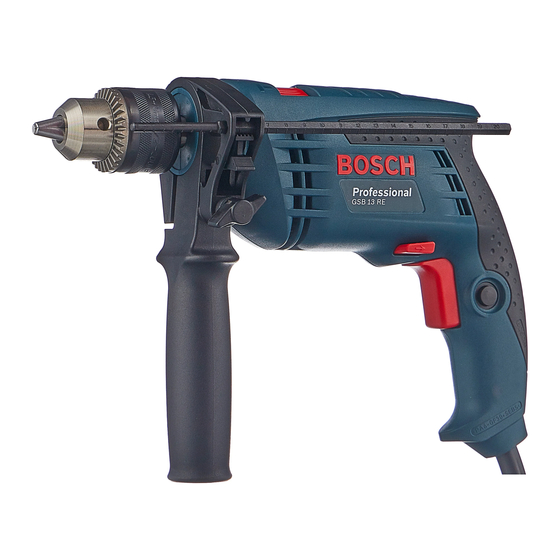14 | English
Replacing the Drill Chuck
Removing the Drill Chuck (see figure E)
To dismount the keyless chuck 1, clamp a Hex key 17 into the
keyless chuck 1 and position an open-end spanner 18
(size 14 mm) against the spanner flats of the drive spindle.
Place the machine on a firm support, e.g., a workbench. Hold
the open-end spanner 18 firmly and loosen the keyless chuck
1 by turning the Hex key 17 in rotation direction . Loosen a
tight seated keyless chuck by giving the long end of the Hex
key 17 a blow. Remove the Hex key from the keyless chuck
and completely unscrew the keyless chuck.
The key type drill chuck 14 is removed in the same manner as
the keyless chuck.
Mounting the Drill Chuck (see figure F)
The keyless chuck/key type drill chuck is mounted in reverse
order.
The drill chuck must be tightened with a tightening
torque of approx. 30–35 Nm.
Dust/Chip Extraction
Dusts from materials such as lead-containing coatings,
some wood types, minerals and metal can be harmful to
one's health. Touching or breathing-in the dusts can cause
allergic reactions and/or lead to respiratory infections of
the user or bystanders.
Certain dusts, such as oak or beech dust, are considered
as carcinogenic, especially in connection with wood-treat-
ment additives (chromate, wood preservative). Materials
containing asbestos may only be worked by specialists.
– Provide for good ventilation of the working place.
– It is recommended to wear a P2 filter-class respirator.
Observe the relevant regulations in your country for the mate-
rials to be worked.
Prevent dust accumulation at the workplace. Dusts can
easily ignite.
Operation
Starting Operation
Observe correct mains voltage! The voltage of the pow-
er source must agree with the voltage specified on the
nameplate of the machine. Power tools marked with
230 V can also be operated with 220 V.
Reversing the rotational direction (see figures G–H)
The rotational direction switch 8 is used to reverse the rota-
tional direction of the machine. However, this is not possible
with the On/Off switch 6 actuated.
Right Rotation: For drilling and driving in screws, push the
rotational direction switch 8 left to the stop.
Left Rotation: For loosening and unscrewing screws and
nuts, press the rotational direction switch 8 through to the
right stop.
1 609 92A 2B1 | (14.3.16)
Setting the operating mode
Drilling and Screwdriving
Set the selector switch 4 to the "Drilling" symbol.
Impact Drilling
Set the selector switch 4 to the "Impact drilling"
symbol.
The selector switch 4 engages noticeably and can also be ac-
tuated with the machine running.
Switching On and Off
To start the machine, press the On/Off switch 6 and keep it
pressed.
To lock the pressed On/Off switch 6, press the lock-on button
5.
To switch off the machine, release the On/Off switch 6 or
when it is locked with the lock-on button 5, briefly press the
On/Off switch 6 and then release it.
To save energy, only switch the power tool on when using it.
Adjusting the Speed/Impact Frequency
The speed/impact rate of the switched on power tool can be
variably adjusted, depending on how far the On/Off switch 6
is pressed.
Light pressure on the On/Off switch 6 results in low speed/im-
pact rate. Further pressure on the switch increases the
speed/impact rate.
Preselecting the Speed/Impact Frequency
(not for machine version 3 601 B17 103)
With the thumbwheel for speed preselection 7, the required
speed/impact frequency can be preselected even during op-
eration.
The required speed/impact frequency depends on the mate-
rial and the working conditions, and can be determined
through practical testing.
Working Advice
Apply the power tool to the screw/nut only when it is
switched off. Rotating tool inserts can slip off.
Before any work on the machine itself, pull the mains
plug.
Tips
After longer periods of working at low speed, allow the ma-
chine to cool down by running it for approx. 3 minutes at max-
imum speed with no load.
For drilling in tiles, set the selector switch 4 to the "Drilling"
symbol. Do not switch over to the symbol "Impact Drilling" or
work with impact until after drilling through the tile.
Use carbide tipped drill bits when working in concrete, ma-
sonry and brick wall.
For drilling in metal, use only perfectly sharpened HSS drill
bits (HSS=high-speed steel). The appropriate quality is guar-
anteed by the Bosch accessories program.
Twist drills from 2.5–10 mm can easily be sharpened with
the drill bit sharpener (see accessories).
Bosch Power Tools

